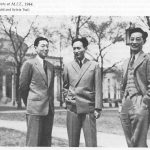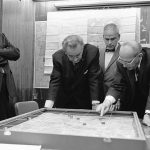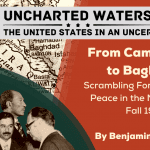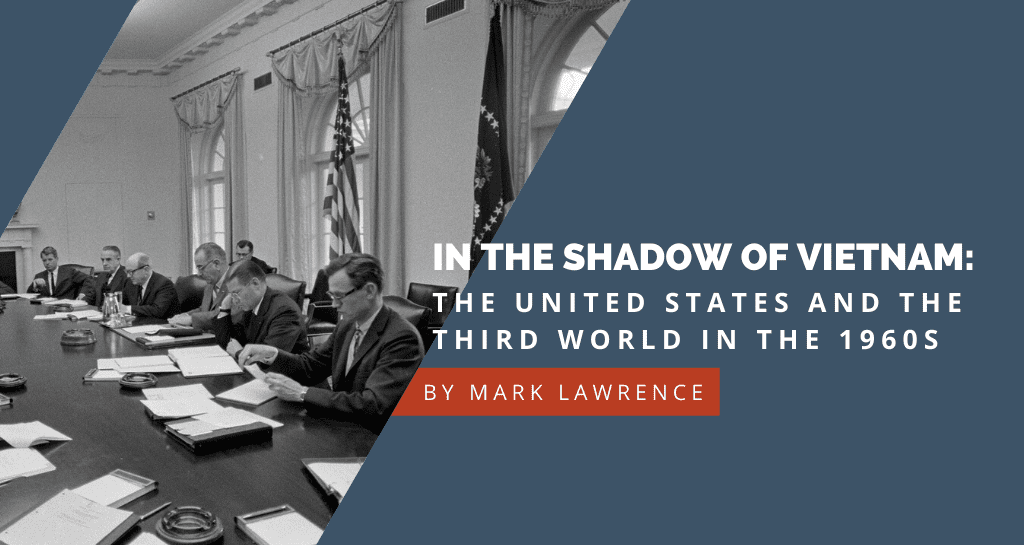
At the dawn of the 1960s, John F. Kennedy and other American liberals expressed boundless optimism about the ability of the United States to promote democracy and economic development in Asia, Africa, the Middle East and Latin America. So vast were American power, resources, and know-how that almost anything seemed possible in regions striving for progress and a stronger voice in international affairs. Confident U.S. officials cultivated postcolonial leaders around the world, urged vastly expanded economic aid for poor nations, and established new bureaucracies such as the Peace Corps and the U.S. Agency for International Development.
By the end of the decade, however, this vision of uplift and harmony between the United States and the world’s emerging nations lay in shambles. Democracy had given way to authoritarianism in numerous nations, while poverty and inequality remained pervasive. U.S. leaders largely gave up on the ambitions that had fired their imaginations only a few years before. They distanced themselves from nations like India, which persisted in policies of non-alignment and grew increasingly critical of the United States. They lost interest in actively promoting racial equity in Southern Africa, where persistent white rule in South Africa, Rhodesia, and the Portuguese colonies confronted the West with difficult dilemmas. And they either formed or tightened relationships with military regimes in nations stretching from Brazil to Indonesia – governments that had scant interest in the welfare of their own people but promised to serve American geopolitical and economic interests

How can we explain this momentous shift in U.S. foreign affairs? The End of Ambition: The United States and the Third World in the Vietnam Era argues that the Vietnam War offers one answer. The war diminished U.S. ambitions in the Third World partly because it demanded so much of America’s military and economic resources, making politicians and policymakers wary of assuming burdens elsewhere and anxious to minimize risks in other regions. As the war in Vietnam dragged on, mounting frustration sapped much of the optimism and confidence that had underpinned the enthusiasm for development and democratization at the start of the decade. The war also undermined the liberal agenda by fueling sharp criticism of the United States in many parts of the Third World, making it increasingly difficult for sympathetic officials in Washington to defend generous and tolerant policies toward areas that seemed increasingly to defy American control.
The war itself was not the sole factor responsible for the transformation that this book aims to explain. The End of Ambition demonstrates that the American retreat from the Third World also resulted from three other developments that transcended the war and would likely have driven significant change in U.S. policy even if no American troops had set foot in Southeast Asia. These three developments were already visible by 1965, when Johnson dramatically escalated U.S. involvement in Vietnam. While their course after that fateful year was not shaped solely by the war, the conflict in Vietnam acted as a powerful accelerant, energizing the other trends leading the United States to reappraise its foreign policies. The effect of the war on the liberal underpinnings of U.S. foreign policy thus ran in parallel to its impact on domestic affairs, where controversy over Vietnam fueled social and political upheaval that steadily eroded policy initiatives that had been embraced by a broad swath of Americans at the start of the Sixties.
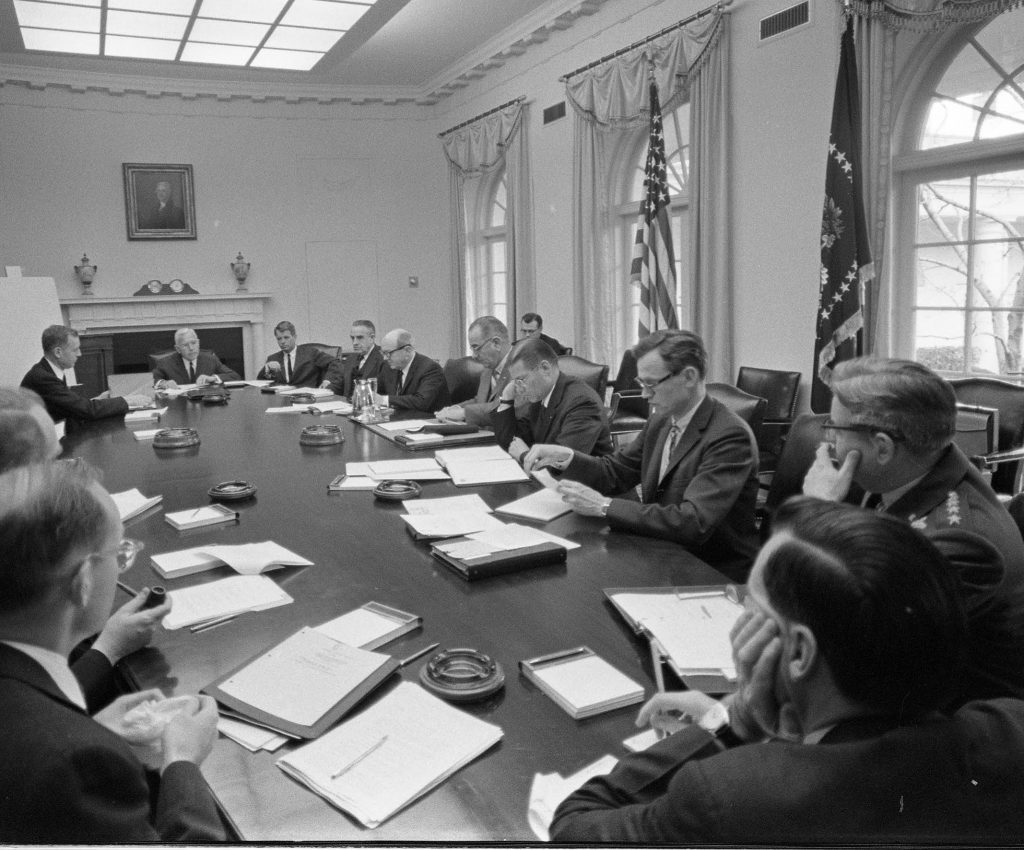
The first trend catalyzed by the war was the shift from U.S. leaders unusually sensitive to the challenges of promoting constructive change in the Third World to others who assigned a far lower priority to the issue. Understanding this pattern depends on appreciating the outlooks and decision-making styles of leaders at the pinnacle of the U.S. bureaucracy. The End of Ambition offers fresh appraisals of three president along with their senior aides. . It argues that John F. Kennedy sincerely cared about the political and economic transformation playing out in much of the Third World and genuinely aspired to recast U.S. policy to swim with what he regarded as the inevitable tide of history. But Kennedy, like the diplomats, journalists, and scholars who surrounded him, never settled on a coherent approach and left behind an inconsistent and even confusing record. For his part, LBJ – a key protagonist in this book – lacked both Kennedy’s interest in the Third World and his patience for debate about American policy. He abandoned much of JFK’s agenda and, particularly as the Vietnam War became a major preoccupation, sought to bolster stability throughout the Third World in order to minimize distractions from his priorities. In this way, Johnson anticipated, more than scholars have acknowledged, the approach embraced by Richard Nixon and Henry Kissinger after they moved into the White House in January 1969. Indeed, the book argues that the Nixon administration did not so much conceive and implement boldly innovative policy departures, as both admirers and detractors have long credited them with doing, as affirm and fully articulate ideas that had been pioneered during the Johnson years.
The second trend that drove U.S. policymaking toward the Third World was the transformation of American domestic politics during the 1960s. During the Sixties, particularly the first half of the decade, many Americans backed liberal reform projects as never before. Yet the 1960s also yielded a powerful surge of conservatism as the pervasive optimism of the early years gave way to disappointment and division, a phenomenon that has increasingly captured the attention of historians focused on explaining the origins of the conservative era that ensued. By around 1965, large numbers of Americans were growing weary of liberal reform and coming to fear that rapid social change threatened their livelihoods and social mores, trends that only intensified under the pressure of political controversies stirred up by U.S. escalation in Vietnam. The book argues that this transformation – as dramatic as any that played out in such a short period of time in all of American history – had profound consequences for both domestic policymaking and U.S. foreign relations. As urban unrest, antiwar protest, and backlash against the perceived excesses of the Great Society fueled hostility to the Johnson administration, policymakers became increasingly wary of risky and costly policies that seemed to invite even greater criticism of the administration if they were not scaled down. Fully cognizant of the shifting political tide, LBJ abandoned what enthusiasm he still had for efforts to revamp U.S. policy toward weak and impoverished nations, diverted funds from aid programs that had been hallmarks of Kennedy’s New Frontier, and grew notably tolerant of authoritarians who promised to bolster U.S. interests.
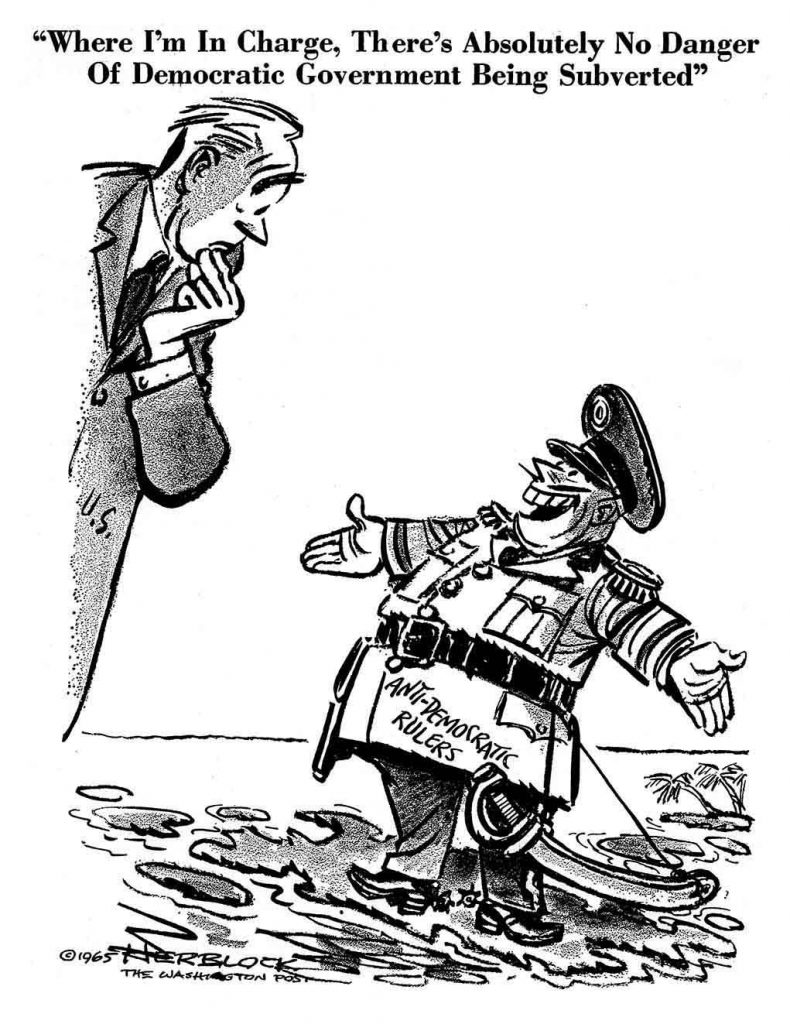
The third trend that contributed to the transformation of U.S. policy was the marked decline of sympathy for the United States across much of the globe during the 1960s. Mounting hostility to U.S. involvement in Vietnam was one major reason for this tendency. Across the Third World, many nationalist leaders castigated the United States for wreaking destruction on an impoverished society and backing an unsavory autocratic regime in Saigon. But other factors, some of them fully visible before Washington became consumed with Southeast Asia, contributed as well to rising anti-Americanism. For one thing, the accelerating Sino-Soviet competition for prestige and influence among the revolutionary movements in Asia, Africa, the Middle East, and Latin America drove both communist powers to emphasize their commitments to radical agendas and to step up their support for anti-Western forces in various places. Meanwhile, the non-aligned impulse that had once inspired some Third World leaders to seek a genuine third way outside the Cold War blocs lost traction. That trend flowed partly from a series of coups that tilted numerous countries sharply to the right during the 1960s. Various forces, meanwhile, led other nations in more radical, anti-Western directions, tilting Third World forums against the United States and encouraging cooperation among anti-Western forces in societies as diverse as North Vietnam, Cuba, and Palestine. The death or downfall of charismatic Afro-Asian leaders such as India’s Jawaharlal Nehru and Ghana’s Kwame Nkrumah opened the way to more radical alternatives, as did growing tension within the Third World. Conflict between India and Pakistan, Iran and Egypt, and Indonesia and Malaysia exacerbated divisiveness within the Third World, shattering the notion of a united Third World operating independently of the great powers.
To tell the story of U.S. policymaking toward vast swaths of the globe across a decade exceeds the limits of a single volume. For this reason, The End of Ambition aims to strike a productive balance between breadth of coverage – both geographical and chronological – and depth of analysis. It begins with a broad-brush treatment of the Kennedy years and concludes with a brief overview of policy departures undertaken early in the Nixon presidency. The goal in these sections is to identify broad patterns of behavior and establish the interpretive arc of the book. In between, the book follows a different approach, offering five case studies chosen to highlight decision-making during the Johnson presidency, a crucial period of transition. These chapters, rooted in deep research in numerous repositories throughout the United States and abroad, permit close examination of U.S. policymaking with respect to nations or regions that posed especially serious challenges. The areas in question – Brazil, India, Iran, Indonesia, and the British territory of Southern Rhodesia – were selected for their clear importance to international affairs in the 1960s and beyond and because they were representativeness of broad challenges that the United States confronted in the 1960s. All of them captured headlines and commanded the attention of U.S. leaders for much or all of the decade, largely because they seemed to be key battlegrounds of the Cold War and to play crucial roles not only in their regions but in the Third World more generally. Taken together, their stories describe the larger arc of America’s relationship with the wider world during an era of profound turbulence and change.
Mark Atwood Lawrence is Director of the LBJ Presidential Library and Museum in Austin, Texas. Until January 2020, he taught as Associate Professor of History at UT-Austin, where his classes focused on American and international history. Lawrence is author of Assuming the Burden: Europe and the American Commitment to War in Vietnam (Berkeley: University of California Press, 2005), which won the Paul Birdsall Prize for European military and strategic history and the George Louis Beer Prize for European international history. In 2008, he published The Vietnam War: A Concise International History (New York: Oxford University Press), which was selected by the History Book Club and the Military History Book Club. He has also published several edited and co-edited books, as well as numerous articles, chapters, and reviews on various aspects of the history of U.S. foreign relations. In 2005, he was awarded the President’s Associates’ Award for Teaching Excellence at UT-Austin and in 2019 the Silver Spurs Centennial Teaching Fellowship from the UT College of Liberal Arts. Lawrence has held the Cassius Marcellus Clay Fellowship at Yale University (2006-2008) and the Stanley Kaplan Visiting Professorship in American Foreign Policy at Williams College (2011-2012). He earned his BA from Stanford University and his PhD from Yale University.
The views and opinions expressed in this article or video are those of the individual author(s) or presenter(s) and do not necessarily reflect the policy or views of the editors at Not Even Past, the UT Department of History, the University of Texas at Austin, or the UT System Board of Regents. Not Even Past is an online public history magazine rather than a peer-reviewed academic journal. While we make efforts to ensure that factual information in articles was obtained from reliable sources, Not Even Past is not responsible for any errors or omissions.
